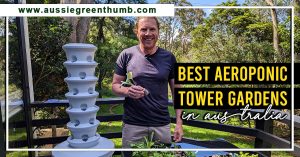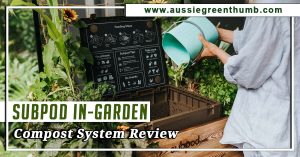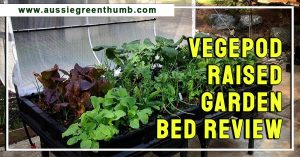Keeping pests out of your home and garden in Australia can be an uphill battle at the best of times, but there are plenty of natural pest control measures you can take to reduce pests in your garden.
Nature often has the answers to problems we’ve spent years treating with chemicals, so in this article, we’ll look at the best natural and organic pest controls and pest repellents that really work.
As well as Aussie pest control options we want to look more at the plants that give their properties to store-bought pest repellents, and insecticides, as well as some methods of gardening for, and with, nature that will ultimately help reduce midges, spiders and aphids all over the garden.
More...
Why Choose Natural Pest Control?
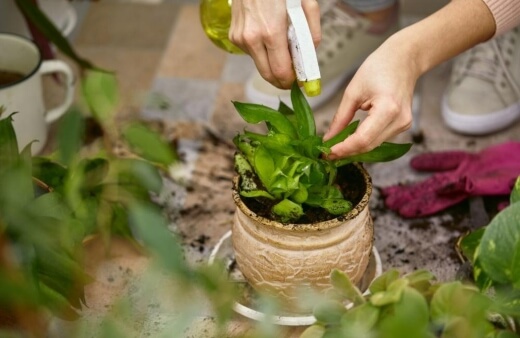
Chemical pesticides damage your plants, and wildlife, and have health risks to humans and pets. Natural pest control measures are not completely without risk, but use chemicals, compounds, and often scents, found in nature to deter pests before they become a problem.
Natural pest control is the easiest, and cheapest, way to deter pests in your garden without regularly using spray insecticides.
Best Natural Pest Controls
There are a few different ways of looking at natural pest control. Part of the choice is around convenience, with many of the more effective solutions being pretty time-consuming, so below we’ll look at some instant fixes for pest problems, as well as DIY jobs that will need a few special organic ingredients bought in.
Beneficial Insects for Pest Control
I’m a big advocate of letting nature take its course, and I’m fascinated by the ability of insects to manage other insects. Often, that means leaving some areas of the garden to grow wild so predatory insects can thrive, other times it just means being a little bit more lenient with some of the other insects we might consider pests.
The best insects to repel and predate pests are:
- Ladybugs
- Ants
- Dragonflies / Damselflies
- Praying mantis
- Ground beetles
- Lacewings
Ladybugs
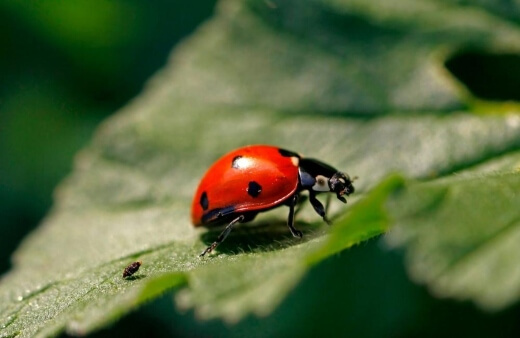
Ladybugs are by far the best species for pest management, predating midges, aphids, mealybugs, spider mites, and even small spiders. You can buy ladybugs online to release into your garden, but they are fairly common throughout Australia and are likely to find plants provided they haven’t been treated with insecticide.
Ants
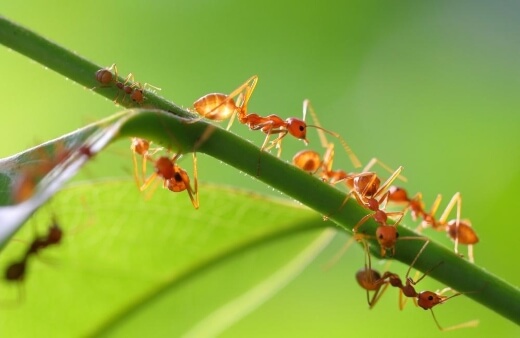
Ants are well known to be clever and well-organised creatures, and often predate smaller insects and larvae. While ants can bite, and do eat leaves of annual plants, they are usually more interested in honeydew – the secretions of small insects often found on growing tips of plants.
Ants actually farm aphids, by moving them from one plant to the next, which helps to reduce aphid damage without killing either species.
Dragonflies and Damselflies
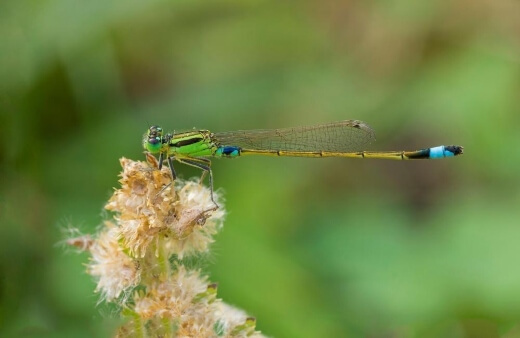
Dragonflies and damselflies eat their own body weight in mosquitoes and midges every day. What’s more, by introducing a pond into your garden, with tall marginal plants, dragonflies will be encouraged to lay eggs.
Their nymphs predate midge larvae, and other pests before they emerge from the pond water, meaning they help to reduce pests in the garden before they are even in their adult form.
Praying Mantis
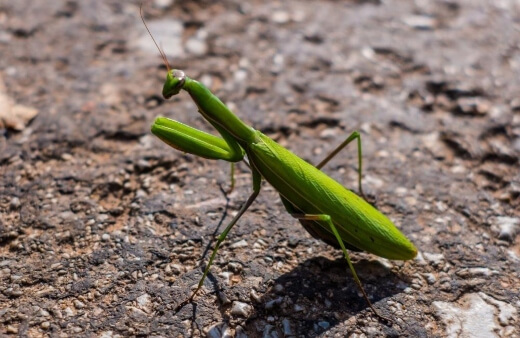
The praying mantis is a well-known pest predator and poses no threat to humans. These elegant insects will only ever bite humans in self-defence, and certainly not without reason.
You can encourage these native insects into the garden by planting deciduous trees, and they will quickly get to work eating any insect that crosses their path.
Ground Beetles
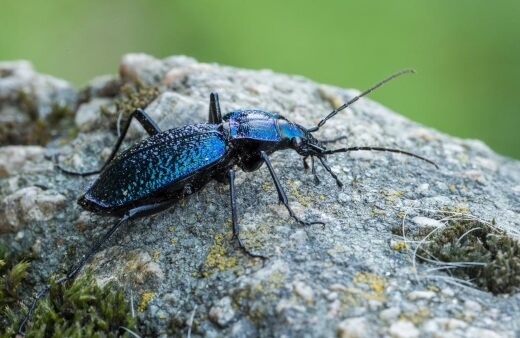
Ground beetles prey on the larvae of other insects and are particularly useful against crop-damaging pests who lay larvae in the soil over winter. There are some species of boring beetles that chew through the roots of plants, but the majority of ground beetles are useful pest predators.
Lacewings
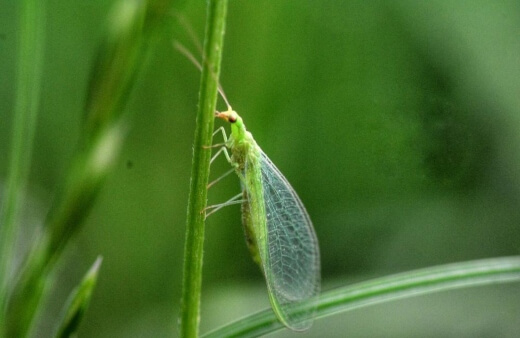
Lacewings are so useful against common veggie pests that they are now sold in many garden centres as a natural form of pest prevention. By providing a selection of nectar-rich plants like honeysuckles, jasmine and any highly scented perennials you can easily encourage lacewings to breed in your garden.
Best Plants for Pest Control
Most chemical pest repellents use essential oils in combination with insecticides, which can irritate the skin, and harm beneficial wildlife too.
To avoid using chemical pesticides or spray repellents, try growing the plants that are used as active ingredients in these sprays, including:
- Eucalyptus
- Lavender
- Marigold
- Mint family
- Chrysanthemum
- Garlic
- Bay
Eucalyptus
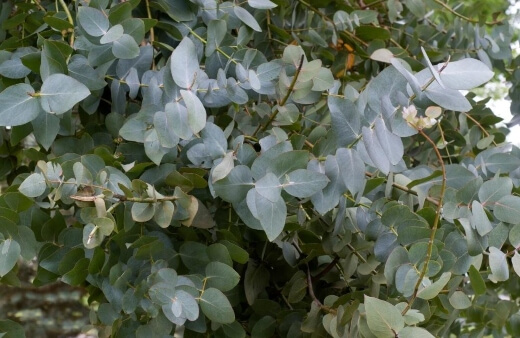
Eucalyptus is easy to grow in Australia, as one of our most iconic native plants. The highly scented essential oils that run through the leaves and stems actively repel spiders from nesting anywhere near them, and can be boiled to create a spray for use on other plants too.
Lavender
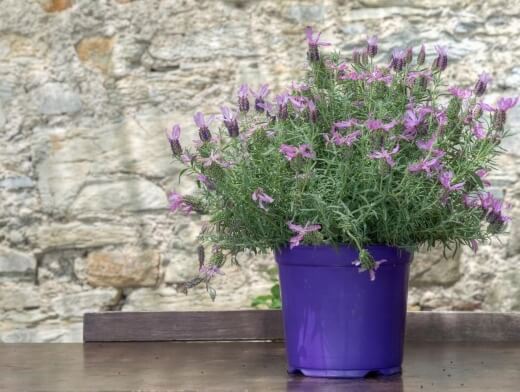
Lavender, like eucalyptus, has potent essential oils which repel spiders and other nesting insects, but it can encourage spittle bugs and mealybug. Growing lavender around your patio has also been shown to reduce midges on warm days when the powerful aroma creates a natural barrier.
Marigolds
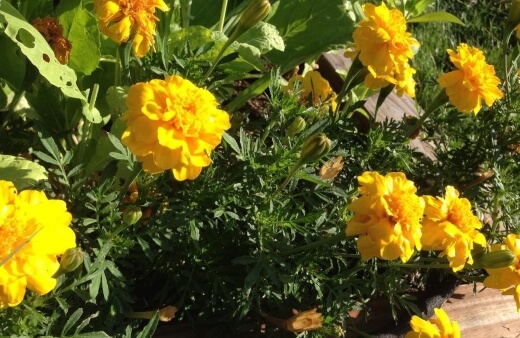
Growing marigolds should be part of every gardener’s slug protection regime as they are far more attractive to slugs than most other crops, and will usually distract them from eating more important plants.
If you don’t suffer from slugs, the natural oils in marigolds are also very effective at repelling aphids, greenflies and blackflies who are put off by limonene, the naturally occurring compound used in most over-the-counter midge sprays.
Growing Guide: Marigold Growing & Care Guide
Mints
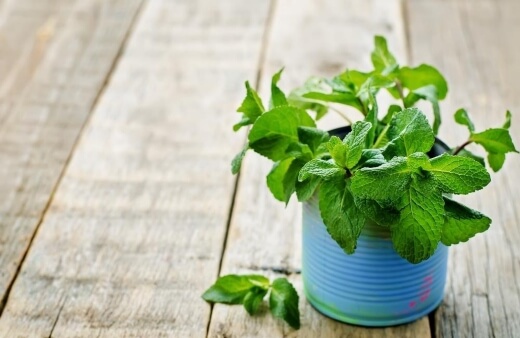
Mint essential oil helps to repel aphids, moths, beetles and ants, so it's great to plant in containers around the patio. Peppermint and spearmint are the most effective true mints, but any member of the mint family, including thyme, oregano and lemon balm is effective as well.
Mint can be very invasive though, so always plant it in containers where the roots can’t spread.
Chrysanthemums
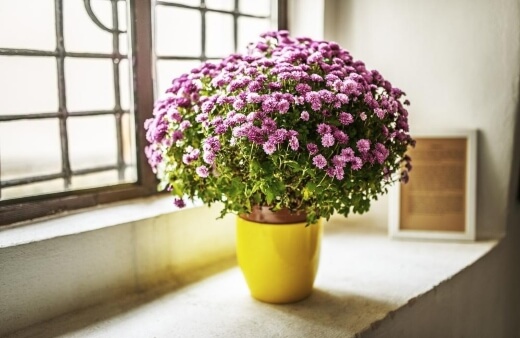
Chrysanthemums contain pyrethrum, a common ingredient in most insect repellents. While the pyrethrum won’t harm you, your pets, or birds, it is incredibly effective at shutting down the nervous system of insects.
The scent is hard-wired into pests, so they won’t go near the plant or its roots. Keeping a pot of chrysanthemum blossoms on the patio table is a great way to keep midges away from your food.
Growing Guide: How to Grow and Care for Chrysanthemum
Garlic
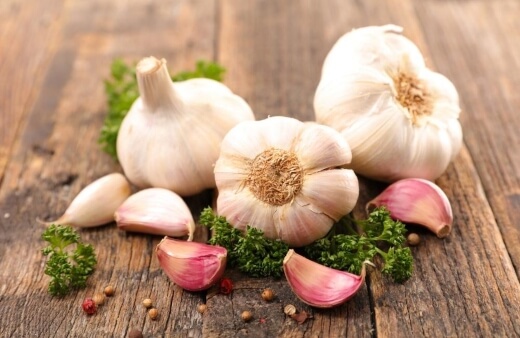
Garlic has endless organic uses, from cold remedies to lowering blood pressure, but it’s also great for deterring aphids and slugs, and the chemical compound, allicin, which gives garlic its flavour, is an effective antioxidant which can help reduce fungal infections spreading on plants.
Growing Guide: How to Grow Garlic in Australia
Bay trees
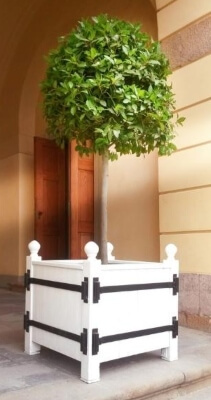
Bay trees are highly toxic to rats, but rodents find it difficult to resist the sweet scent of their foliage. The result is almost always dead rats, which might not be everyone’s cup of tea, but for a natural form of pest control that doesn’t harm other wildlife, bay is a particularly effective form of rodent prevention.
DIY Aussie Pest Controls (and how to make them)
Many of the plants you grow in the garden to repel pests can be turned into natural remedies, which we’ll look at below, but as well at that, there are some great natural ingredients you probably already have in the cupboard that effectively prevent pests from entering the house, or effecting your veggies.
Roundup alternatives without glyphosate are available and can be effective. Organic brand options use naturally occurring oils or acids, and some alternatives can even be made with household ingredients, so we can avoid putting humans and animals at risk by exposing themselves to these toxic chemicals.
Essential Oil Sprays
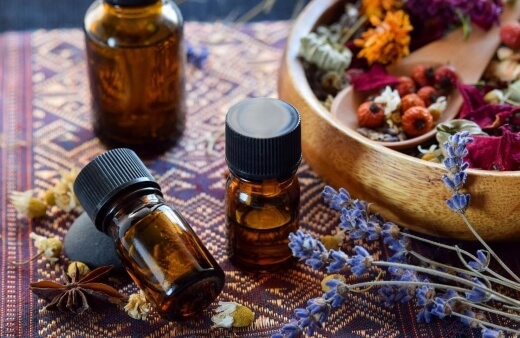
Essential oil sprays are easy to make and require a basic mix of water and vodka, or witch hazel. The vodka and witch hazel are essentially carriers which help to stabilise the concoction, so use whatever is to hand.
The recipe below uses, citronella, eucalyptus, lavender and limonene, but these can be substituted for any of the essential oils below (just use a maximum of 75 drops of oil as a total):
- Citronella - Citronella Plants Growing Guide
- Cedarwood
- Eucalyptus
- Peppermint
- Lemon
- Catnip - Catnip Growing Guide
- Basil
- Clove
- Thyme - Thyme How to Grow Guide
- Geranium
- Lavender
- Tea tree
- Pine
- Juniper
- Lemongrass - Lemongrass Growing Guide
- Oregano
Recipe:
Use this recipe as a base for essential oils, rather than sticking to the oils described below. Each essential oil is effective against different species, so find the right mix for your pest problem:
- 500ml spray bottle
- 200ml boiled water
- 200ml vodka/witch hazel
- 1tsp. castile soap (or tbsp. grated unscented hand soap dissolved in the water)
- 20 drops citronella oil
- 20 drops eucalyptus oil
- 10 drops peppermint oil
- 10 drops clove oil
- 10 drops geranium oil
Method:
Fill a 500ml spray bottle with boiled water, mixed with soap. Add the vodka or witch hazel to the mixture, then add roughly 70 drops of your chosen essential oils. Mix by shaking and apply to the skin or corners of the room where pests are usually found.
This makes an excellent room spray or body spray during summer, and stores for up to 12 months in a cool dry cupboard.
Slug Traps
If slugs are a serious problem in your garden but you don’t want to use chemical slug killers, then there are plenty of organic controls you can take that don’t harm other animals. The most effective method of slug control is to make your own DIY beer trap.
You will need:
- Two Tupperware boxes, one slightly larger than the other
- Scissors
- Trowel - See our review of the best trowels available online.
- Beer (lager is best)
Method:
- Dig a hole in the ground just large enough for the smallest Tupperware to sit level with the soil surface.
- Cut a few small holes around the rim of the larger Tupperware so slugs can get in, but birds, mammals, snakes and snails won’t fit.
- Fill the smaller Tupperware with beer and place it in the hole.
- Place the larger Tupperware upside-down over the top.
- Leave overnight, then check in the morning.
- Bin the dead slugs.
Note: Do not put dead slugs on the bird table, or out in the garden as they will intoxicate any animal that eats them.
DIY Insecticides
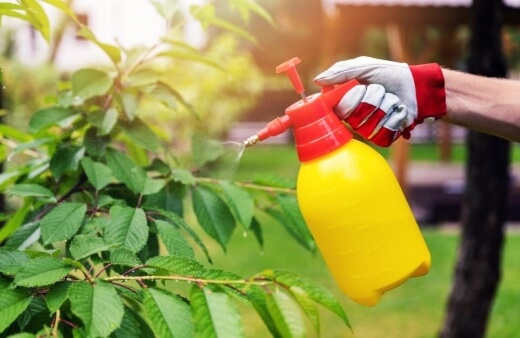
If you’ve got an infestation of aphids crawling all over your plants and they just won’t leave, then waiting for pest repelling plants, or trying to prevent them isn’t going to work.
Thankfully, there are a few natural insecticides you can make at home without damaging other wildlife in the process. The basic principle of insecticides is that they kill insects through toxicity, dehydration, or suffocation.
Limonene is the most common chemical used to attack nervous systems, and baking powder mixed with water quickly dehydrates most invertebrates and small insects.
Soaps create a suffocating barrier that kills insects and helps other ingredients stick.
Recipe:
- 500ml spray bottle
- 400ml boiled water
- 50ml castile soap (or grated hand soap dissolved in the water)
- Two tablespoons of baking powder
- 25ml Neem oil (optional)
- 25ml limonene oil(optional)
Method
- Mix all the ingredients in the bottle
- Shake well
- To increase the effectiveness of the recipe, add 25ml each of neem oil and limonene oil
How to Use
Spray directly onto pests, avoiding any contact with other insects. Once dry, the spray has no effect, but neme and limonene act as a mild deterrent when dry.
Hot Pepper Slug Deterrent Powder
You can make your own pepper powder from the garden, or, use store-bought pepper flakes. Both produce an incredibly uncomfortable surface for slugs and help prevent animals from digging up your garden bulbs.
The recipe below uses a few different home remedies to create the ultimate anti-slug surface that also fertilises your plants!
Recipe:
- 1 cup of chilli flakes (dry your own chillies, or use store-bought)
- 1 cup of egg shells, partially crushed
- 1 cup of wood ash (burn down any dry timber)
Method:
Mix all ingredients in a bowl in equal parts, and then sprinkle them around your plants. The combination of chilli, eggshells and wood ash will keep slugs at bay as well as any store-bought slug barriers, and also works to stop rodents from digging up your tulips bulbs too.
Make sure the eggs aren’t crushed too finely as they need sharp surfaces to be effective against slugs. In time, this barrier becomes less effective, but as it degrades, the wood ash and egg shells will fertilise your soil.
Garlic Tea / Onion Tea
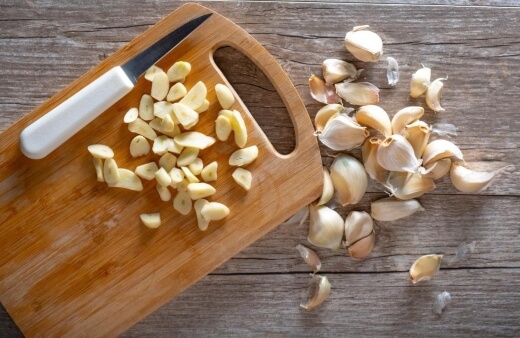
Garlic and onion tea are full of allicin – the chemical that makes your eyes water, and your hands sting when you cut them. It gives alliums like these their distinctive smell, which gets stronger in varieties with more allicin.
As well as providing a barrier against pests like aphids, whitefly and slugs, allicin tea made from garlic or onion helps reduce fungal infections and works as a mild foliar feed for many plants that slugs like to feed on, so not only reduces pests but improves overall plant health.
Recipe:
- 1 bulb of garlic, chopped
- 1L water
- 3tbsp. liquid soap (preferably castile soap)
- Strainer/sieve
- Spray 1L spray bottle
Method:
- Chop or crush one whole bulb of garlic and mix with a cup of water to create a paste. The finer you chop, the more allicin comes out.
- Add the mixture to the remaining water with 3tbsp. of liquid soap.
- Mix well, then leave overnight.
- Strain the mixture with a sieve or through muslin.
- Decant into a spray bottle.
- Spray onto slug-prone plants in the evening, and repeat spray after rainfall.
Learn how to get rid of flies without harming your plants here.
Best Natural Pest Repellents for 2024
If DIY pest control isn’t your thing, we’ve also had a look for the most reliable natural pest controls, and thankfully the best ones we’ve found are all organic pest control measures too.
1. NATURAL OUST Peppermint Oil Spider Repellent Spray
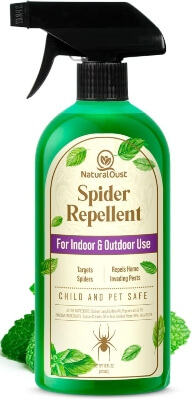
Source: amazon.com.au
Peppermint sprays are generally pretty good against spiders, and the biggest positive is that it smells nice to use too. So rather than using vinegar or unpleasant scents to deter them, you can actually enjoy this spray from NaturalOust, which works indoors, and out on the patio too, but will need reapplying every few weeks through autumn.
As well as repelling spiders, which is the main job of this spray from NaturalOust, it’s effective at repelling rodents and flying insects too, which all seem to really dislike the menthol odour.
2. Defender Pyrethrum Natural Insect Spray
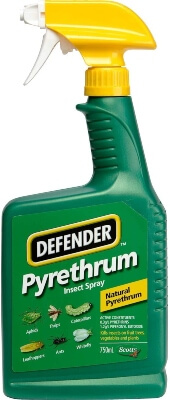
Source: amazon.com.au
Pyrethrum works as a repellent and a natural insecticide. Insecticides aren’t technically considered organic, but the chemicals are derived from chrysanthemum oils and concentrated into this stable spray which works incredibly effectively by completely shutting down the nervous system of most insects when directly applied.
Even when dry, the spray continues to work as a deterrent against most flying insects, who are hard-wired to understand that the scent of pyrethrum means danger.
3. Plano Emulsified 100 % Neem oil
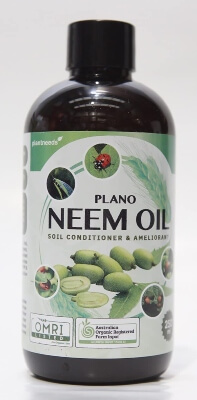
Source: amazon.com.au
You can grow your own neem trees throughout Australia, making neem oil fairly accessible, but extracting it takes a lot of work, so this great value bottle of neem oil from Plano is a much faster option, giving you ready access to this natural, organic pesticide which can be applied directly to pests, or mixed into other recipes to make them more effective.
4. IV Organic 3-in-1 Plant Guard
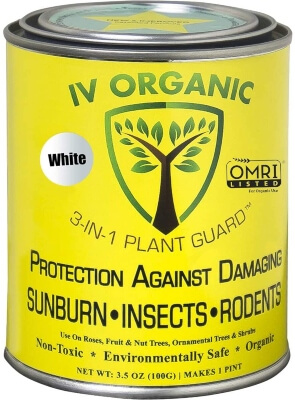
Source: amazon.com.au
IV Organic’s range of plant protection treatments is outstanding, and this clever stem treatment for trees and shrubs is a great way to protect them against insect and rodent damage, as well as protect more tender shrubs from the hottest Australian weather.
Essentially, IV Organic’s 3-in-1 plant guard is a paintable paste infused with castor oil. Castor oil tastes utterly disgusting to humans, rodents and insects, so anything that tries to damage your plants will quickly leave.
You can also dilute the contents of the tin with water to make a foliar spray, which helps protect shade-loving plants from the sun and reduce the likelihood of pest damage.
5. AMERFIST Solar Animal Repeller
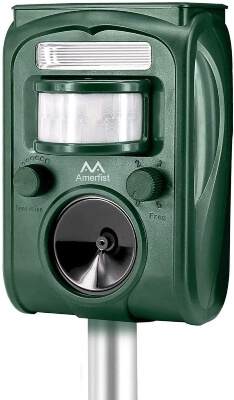
Source: amazon.com.au
When we think of organic pest control measures we often think of it as a way of doing everything completely naturally, but often the least damaging way to repel pests is by using ultrasonic devices which scare them away from your garden.
These devices do no harm to wildlife, and rarely affect insects, so won’t limit the bird or insect species in your garden. If rats, rabbits or deer are a problem for you though, then these devices might be worth looking into.
This ultrasonic animal repellent is fully solar-powered, so just needs switching on, and the frequency is completely adjustable too, so if you don’t have good effects on day 1, just try changing the frequency until it works.
Pest Control Frequently Asked Questions
Is diatomaceous earth safe to use in the garden?
Diatomaceous earth is generally considered safe, but if used improperly it can cause lung damage if inhaled. The biggest problem with diatomaceous earth is that it is untargeted, meaning it kills all insects it touches.
What is the best natural spider repellent?
The best natural spider repellent is tea tree oil or eucalyptus oil. Both work equally well to deter spiders, and regular applications of tea tree oil to the corners of rooms where spiders typically make their webs will work wonders to deter them from setting up home in your house.
Alternatively, planting eucalyptus in the garden is a good way to deter them from setting up home near the patio. Here is a comprehensive guide on natural spider repellents.
What is an easy DIY pesticide?
Mix baking soda, salt and water in a spray bottle and spray directly onto pests. The salt and baking soda will quickly dehydrate insects with soft exoskeletons and kill them without causing lasting damage to your home, or other wildlife.
Wrapping Up Our Guide on the Best Natural Pest Control for Your Garden
It’s rare that pests are welcomed into a garden, as by their very nature they are destructive, or even dangerous creatures that are better kept at bay.
But for some, the story is more complicated, and by creating a wildlife-friendly garden where nature can manage itself, you will quickly see reduced numbers of pests, and healthier plants as a result.
Natural pest control often trips up gardeners, who are quick to dismiss it as fake science, but in reality, the strongest chemical insecticides you can buy are just made up of synthetic versions of the chemicals found in plants.
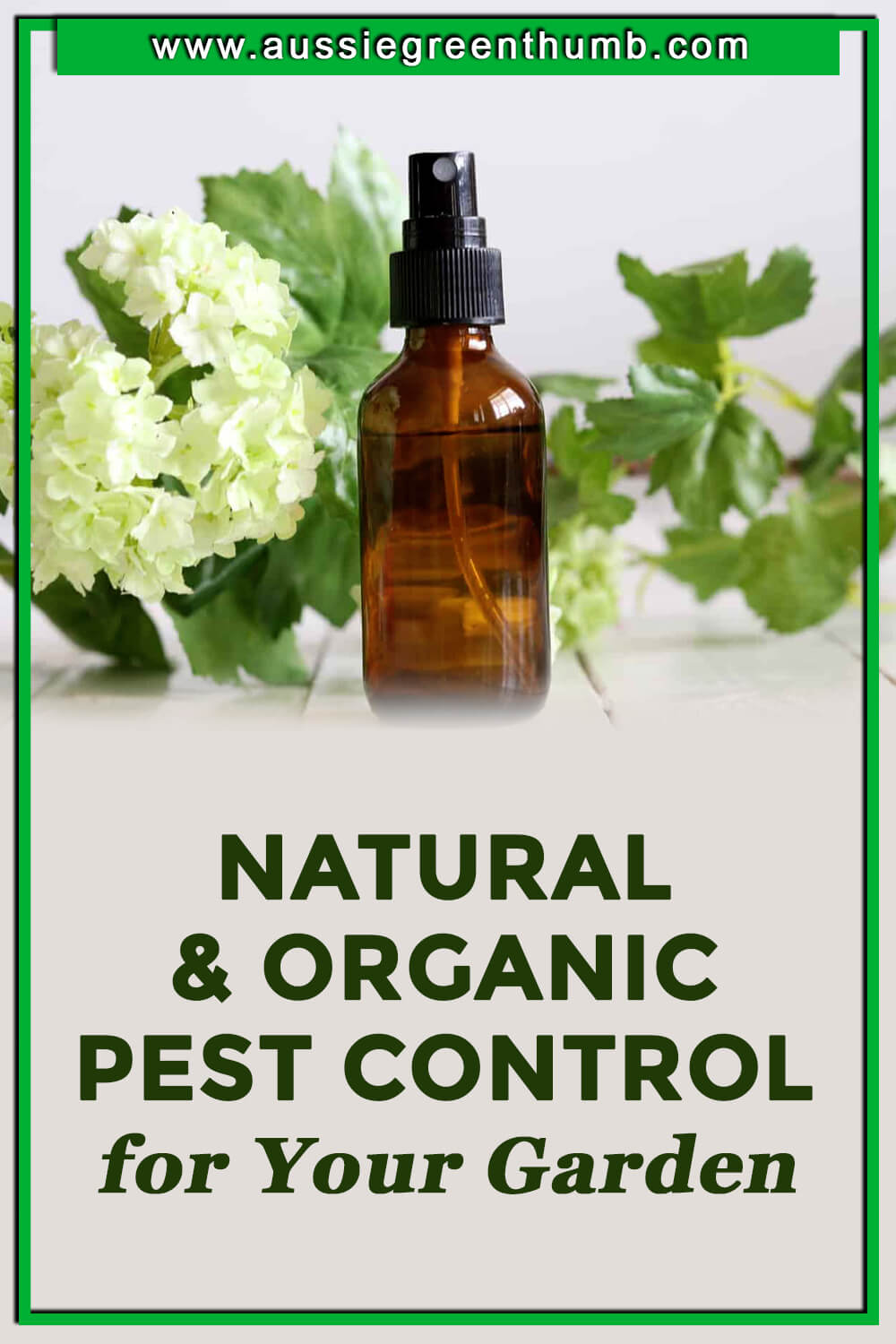
Published on June 18, 2022 by Gary Clarke
Last Updated on January 11, 2024

